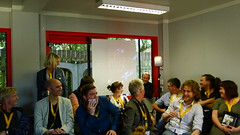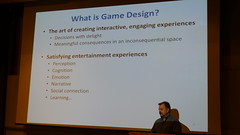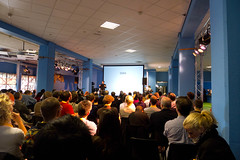
Eric Zimmerman was the first key-note.
My jotted words: We are not just researchers, we are also educators.
We are still justifying game research. Danger of becoming irrelevant. Gamification, instrumentalization. Entering the ludic century: The necessity of understanding complex systems (gaming literacy).
Jon Manker and I were matched, so we presented in the same session. Jon has interviewed 27 game designers about their prototyping process, and matched different stages and activities to terms used in rhetoric. Parthes, for example, is negotiation, topops is subject, and pistis is trust. Synecdoc is the understanding of the whole.
When I presented we could map some of the terms to the examples that I showed.
We presented on the first session, so we were not really sure about the new presentation format the Digra conference was trying out. I found it really nice with the matching - that was a good thing. But I wasn’t too fond of the “match cards”. I was at the end of my short talk, and just about to deliver the actual research results when one member in the audience interrupted me. She requested that Jon should start discussing. I became so flustered and confused that I only presented the parts of the results that were specific to the game-design I had presented. I never told the audience about what general conclusions that were possible to draw from the play-tests done. Instead i tried to bend over adhering to the “match game” given by that card. As the conference went on the match cards weren’t used, and people tended to just do present their research. I liked that since that’s why i went to the conference in the first place. I’m not sure what to make of that, since I don’t know what motivations others’ had when going to certain presentations. *I* would be interested to hear about the research results, but others might prefer discussions and games loosely related to the research subjects instead. That’s OK too. Anyone who went to the session and is curios about the research I have done can find the paper in the Digra digital library (look for the 2011-paper in the list).
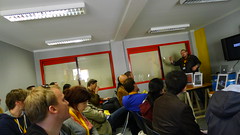
Next, I went to Jonas Linderoth’s presentation. He talked about the importance of gaming psychologies that fits reality, and about affordances. (Norman’s and Gibson’s notions, and how they differ from Jonas’ view on affordances - ie the empty spaces between the puzzle-pieces.)
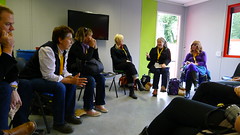
I had my lunch sandwich in the cabin where the Feminist game panel was. Susanne de Castel and her co-workers are launching a project calling for initiatives where interventions can change local conditions.
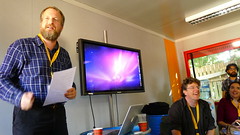
When Espen Aarseth and Bart Simon was matched for a session the cabin was full. Bart toyed with the concept of games as a platform for social imagination. Espen tried to “steal back the term Ludus from Caillois misuse”. He showed Mark Twains paint-the-fence as an early example of the idea of gamification. ...Caillois and Huizinga as romanticists, seeing games as something other, something better... Magic Circle backlash. Then, Espen pointed at Eric and stated that the concept of the magic circle wasn’t very central to Huizinga anyway, that it became so because Eric and Katie pointed it out as such in their rules of play book. Espen said that Huizinga only mentioned the magic circle twice, but then Jaakko had to interrupt and say that he indeed mentions it *three* times. Espen then moved on to saying that we should stop being an apologetic club and start doing critical work, after which he indudec a bashing of how Goffmans theories are used. Somehow the discussion came into gambling, and Frans said that it has been considered too simplistic and random by researchers to be interesting as a research subject. Then, Gordon stuck in his head through the window and said a few words to Huizinga’s defence:
